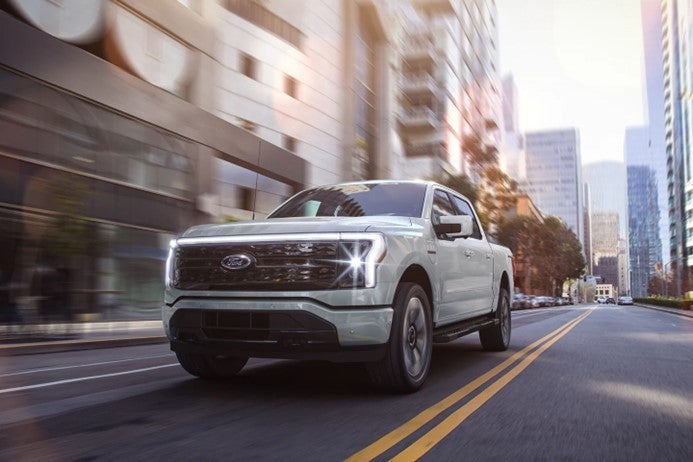
Ford has updated its strategy for electric vehicle manufacturing and offerings that appears to slow its advance into battery electric vehicles (BEVs) and away from fossil-fuel based internal combustion engines (ICEs).

Discover B2B Marketing That Performs
Combine business intelligence and editorial excellence to reach engaged professionals across 36 leading media platforms.
Ford said it is broadening its electrification choices for customers and adjusting its rollout of pure electric vehicles to deliver a ‘capital-efficient, profitable electric vehicle business’ (its EV division is still heavily loss-making), while continuing to significantly reduce its carbon emissions over time.
Ford said it aims to offer a range of electrification options designed to speed customer adoption, including lower prices and longer ranges.
In its fully electric portfolio, Ford plans to introduce an all-new commercial van that will begin production in 2026 in Ohio, closely followed in 2027 by two new pickup trucks – a medium-sized pickup based on the platform designed by Ford’s California skunkworks team and a next-generation truck to be assembled in Tennessee.
Ford said it now plans to leverage hybrid technologies – rather than pure electric powertrains – for its next three-row SUVs. As a result of this decision, the company will take a special non-cash charge of about $400 million for the write-down of certain product-specific manufacturing assets for the previously planned all-electric three-row SUVs, which Ford will no longer produce.
In its fully electric portfolio, Ford will prioritise the introduction of a new digitally advanced commercial van in 2026, followed by two new advanced pickup trucks in 2027 and other future affordable vehicles. Ford also realigned its US battery sourcing plan to reduce costs, maximize capacity utilisation, and support current and future electric vehicle production.
“We are committed to innovating in America, creating jobs and delivering incredible new electric and hybrid vehicles that make a real difference in CO2 reduction,” said Ford President and CEO Jim Farley. “We learned a lot as the No. 2 US electric vehicle brand about what customers want and value, and what it takes to match the best in the world with cost-efficient design, and we have built a plan that gives our customers maximum choice and plays to our strengths.”
Ford said the electric vehicle market is rapidly evolving as Chinese competitors leverage ‘advantaged cost structures including vertical integration, low-cost engineering, multi-energy advanced battery technology and digital experiences to expand their global market share’.
Ford also said market dynamics underscore the necessity of a globally competitive cost structure while being selective about customer and product segments to ensure profitable growth and capital efficiency.
Ford CFO John Lawler said an important enabler to improve profitability is accelerating the mix of battery production in the US that will qualify for the Advanced Manufacturing Tax Credit. Also, given the propulsion options, and increasing demand for hybrids, Ford’s mix of annual capital expenditures dedicated to pure electric vehicles will decline from about 40% to 30%.
Next-gen electric truck timing put back
Ford is retiming the launch of its next electric truck code-named “Project T3” to the second half of 2027 (from previous plans for late 2025). The truck will offer features and experiences ‘never seen on any Ford truck’, including upgraded bi-directional charging capability and advanced aerodynamics. The truck will be assembled at BlueOval City’s Tennessee Electric Vehicle Center.
Ford maintains retiming the launch allows the company to utilise lower-cost battery technology and take advantage of other cost breakthroughs while the market continues to develop.
Skunkworks electric vehicle platform for lower costs
In 2022, Ford established a skunkworks team in California focused on changing the company’s approach to next-generation vehicle development and bending the cost curve on electric vehicles. It said the team takes a systems-integration approach across design, engineering, supply chain and manufacturing to ‘fundamentally rethink the full vehicle’. Managed to reduce cost and complexity, the approach will go deeper into the supply chain and benchmark cost against the best competitors in the world, Ford claims.
“We recruited the most technically skilled and creative professionals from inside and outside Ford to drive a radical change in how we develop an electric vehicle,” Farley said. “The work of this highly talented team has evolved into a critical enabler of our electric vehicle strategy. These electric vehicles will be lower cost, and not compromised in any way.”
The first affordable vehicle off this new platform will be the mid-sized electric pickup launching in 2027.
Ford says a globally competitive electric vehicle cost structure is the aim and the platform is designed with minimal complexity to scale quickly by underpinning multiple vehicle styles – for both retail and commercial customers. It is also designed to deliver personalised digital experiences that are expandable, always updating and building on features such as BlueCruise and Ford Pro Telematics. This will increase the installed base for software and services – improving Ford’s mix of sticky, profitable revenue over time, it says.






